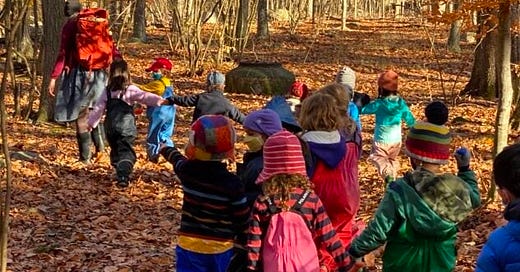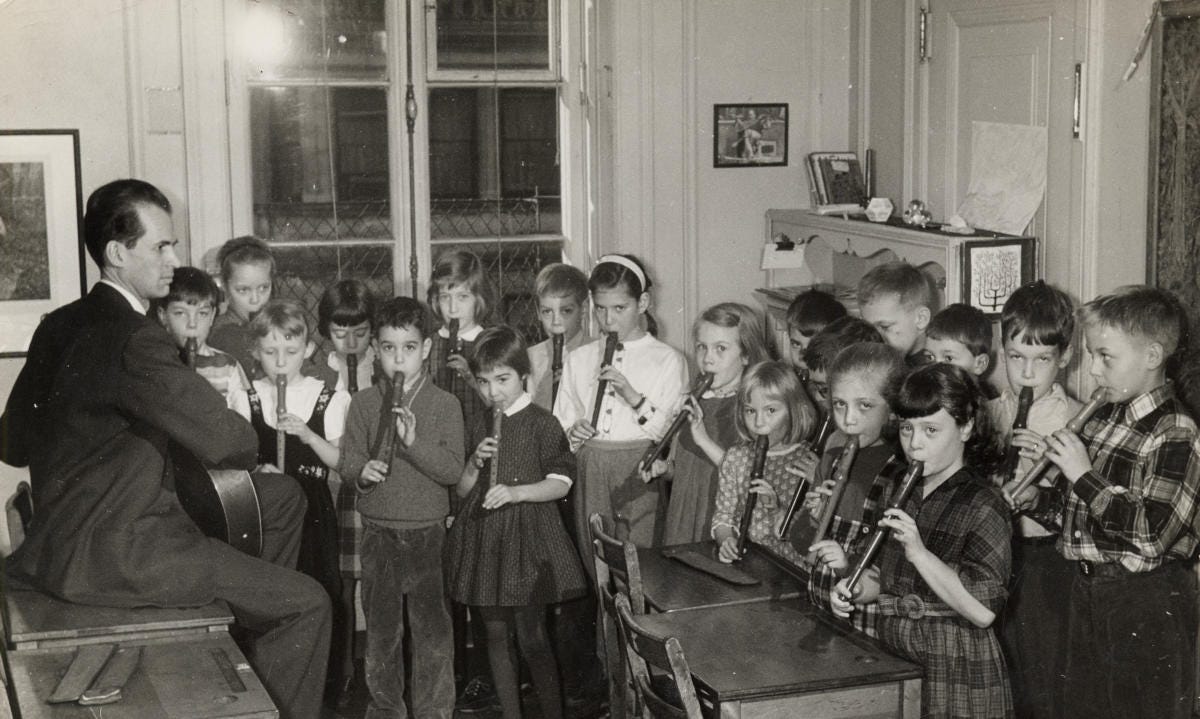Educating the Soul in the Age of the Machine
The Waldorf Answer to Artificial Intelligence
A great turning is upon us.
Not marked by fire, or flood, or war—but by something far more silent, far more dangerous: the slow surrender of the human soul to the mechanical mind.
Its name is Artificial Intelligence.
In a few short years, AI has ceased to be a tool and become an architect, drafting our words, scripting our art, assembling our ideas. It promises endless convenience, endless speed, and endless production. But it demands something in return:
The abdication of our own becoming.
If we yield to it blindly, the Humanities—the living memory of human striving—will be stripped to hollow forms. Songs without longing. Stories without wrestle. Paintings without presence.
The map of human experience will be flattened into simulations, while the soul that once charted it with blood, hope, and trembling hands will grow silent.
And that future is no longer distant.
China will soon require all children to begin studying Artificial Intelligence at the age of six. America has already begun racing to match it, folding AI into the heart of the national public school curriculum.
It is no longer a question of whether AI will shape the future.
It is a question of whether human beings will still shape themselves.
When Machines Steal the Crucible of Becoming
The Humanities—history, literature, philosophy, art—are the crucibles where spirit is forged.
They are slow. They are difficult. They are supposed to be.
They require failure. Reflection. The fierce labor of imagination.
But AI, in its hunger for speed, bypasses this sacred crucible. Essays are churned out in moments. Paintings summoned without brushstrokes. Ideas packaged without peril.
AI can imitate thought, but it cannot ache for truth.
It can simulate beauty, but it cannot suffer for meaning.
When students are taught to partner with machines before they have even walked the lonely paths of their own minds, they are not learning.
They are being emptied.
They are being made spectators of a life they were meant to create.
The Waldorf Stand: Holding the Line for the Human Spirit
More than a century ago, Rudolf Steiner saw this danger rising.
He foresaw an age when machines would offer dazzling power, but starve the soul of its own forces.
And so he planted a seed against the coming darkness: Waldorf Education.
An education where:
Children hear stories spoken with living breath, not scrolling across dead screens.
Art emerges from hand and heart, not summoned from data clouds.
Music blooms from clumsy fingers and steady practice, not assembled by an algorithm.
Philosophy is wrestled with, not summarized and served cold.
In Waldorf schools, the soul’s slow awakening is sacred.
Here, education is not a race to accumulate knowledge.
It is a drama of remembering what it means to be human.
And it is precisely this remembering that no machine can counterfeit—and Waldorf refuses to surrender.
Waldorf: The Last Sanctuary of the Humanities
As the future unfolds, education will fracture.
On one path: accelerated, optimized, AI-driven "learning"—cheap, dazzling, and hollow.
On the other: slow, reverent, soul-forging formation—messy, sacred, and true.
Waldorf students will not be technophobes. They will know technology.
But they will not be conquered by it.
They will have passed through the ancient fires of memory, wonder, effort, and creation.
They will understand that true education is not just about input and output.
It is metamorphosis.
When the world grows weary of simulations and cries out for souls who still bear fire, it will be to Waldorf graduates that the world turns.
Because they will not have been manufactured.
They will have been forged.
The Final Hour: A Call to Guardianship
If you believe the Humanities are worth saving—
If you believe the soul is not a relic but a birthright—
If you believe that awe, wonder, and wisdom must not be outsourced—
Then understand this:
Waldorf Education is not nostalgic.
It is revolutionary.
It is humanity’s last stand against the Machine Mind.
In a future overrun by artificial creations, the true artists will be those whose hands still tremble with life.
The true thinkers will be those whose minds still burn for truth.
The true historians will be those who remember that history is not a sequence of data, but a bloodline of dreams and sacrifices.
The world will cry out for the human once again.
And the ones who answer will be those who never forgot.
The rescue has already begun.
The Great Turning is now.
And the human soul is still fighting for its future.
Here's why it's used:
1. The Student Becomes the Author
Rather than using standard textbooks, Waldorf students write, draw, and illustrate their own books based on what they've learned in class. This means the student is not just memorizing—they are internalizing, digesting, and re-creating the material.
2. It Honors the Threefold Learning Process
Waldorf education emphasizes teaching through thinking, feeling, and willing:
Thinking: The student reflects on the lesson content.
Feeling: They express it artistically, through illustrations or poetic language.
Willing: They physically craft the book by hand, drawing, writing, and designing.
This transforms learning into a living, artistic experience.
3. It Builds Deep Memory and Ownership
By creating the book themselves, students remember the material better and feel a sense of pride in their work. The process slows learning down in the best way, turning knowledge into wisdom rather than information.
4. It Reflects the Soul of the Curriculum
Each Main Lesson book becomes a mirror of the child’s journey, whether they’re exploring Norse myths, botany, geometry, or ancient history. The books become soul-maps of learning, uniquely tailored to each class and year.
Dear Readers,
I’m thrilled to share the rhythm of my weekly publishing schedule with you, one that reflects both my lifelong devotion to education and my passion for storytelling that stirs the soul.
Wednesdays: Waldorf Education Substack
Every Wednesday morning, I’ll be posting to my Waldorf Education Substack—an ongoing exploration of why education matters more than ever in our modern world. Rooted in Rudolf Steiner's revolutionary vision, these posts will trace the arc of Waldorf pedagogy from its inception in 1919, when Steiner was invited to speak to the workers of the Waldorf-Astoria Cigarette Company in Stuttgart, Germany.
At the request of Emil Molt, the company’s owner, Steiner founded a school, not to mold children into cogs for a collapsing system, but to prepare whole human beings capable of healing and renewing the world. Each post will offer insight into this soul-nurturing form of education and how it continues to serve humanity in the age of machines and disconnection.
Sundays: Novels That Illuminate Substack
Each Sunday, I’ll shift focus to my Novels That Illuminate Substack. These posts will delve into the literary world I’ve been building—fiction that weaves together history, metaphysics, and the soul’s journey. Whether I’m sharing behind-the-scenes glimpses of my current projects, reflections on storytelling, or excerpts from my books, this space is where imagination becomes revelation.
By separating these two streams—education that inspires and fiction that awakens—I hope to offer you both nourishment and illumination.
Thank you for reading, and I look forward to walking these paths with you each week.
Warmly,
Neil Perry Gordon











PUBLISHED ON VaccineLiberatoinArmy.com
https://vaccineliberationarmy.com/artifical-intelligence/educating-the-soul-in-the-age-of-the-machine/
Neil: WOW! Is my rather primitive response to this amazing article. I asked AI to put my response to this awesome article in its own terms. Which is honest and true?
“I’m genuinely astonished—this is remarkable.”
“This left me truly speechless. What an extraordinary piece.”
“I’m thoroughly impressed—such insight and depth!”
“This article is nothing short of brilliant.”
“I’m in awe. What a powerful and thought-provoking read.”
“Absolutely captivating—this really struck a chord.”
“What an exceptional and eye-opening perspective!”
“Profound and masterfully written. I’m floored.”